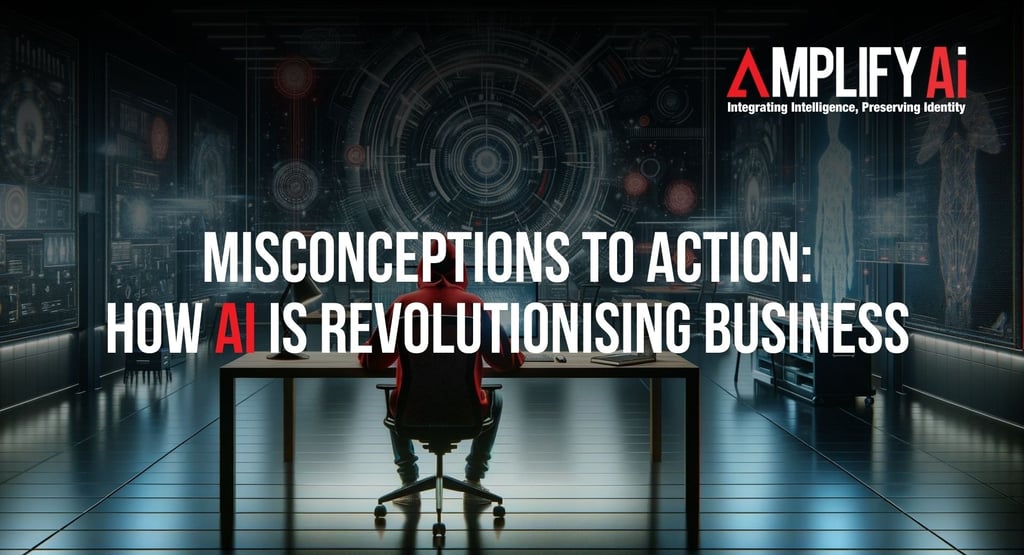Misconceptions to Action: How AI Is Revolutionising Business
Ronsley Vaz
4 min read


Artificial Intelligence (AI) has emerged as a transformative force in the business world, revolutionising industries and opening up new possibilities for growth and innovation. In this digital era, where technology is constantly evolving, AI stands out as one of the most powerful and game-changing tools that organisations can leverage to gain a significant competitive edge. With its ability to rapidly analyse vast amounts of data, AI has the potential to revolutionise decision-making processes, streamline operations, and drive business success.
Despite the immense potential of AI, there are still many misconceptions and uncertainties surrounding its adoption and implementation. Some may view AI as a complex and inaccessible technology reserved only for large corporations with extensive resources. However, the reality is that AI is becoming increasingly accessible and affordable, with solutions tailored for businesses of all sizes. From small start-ups to multinational corporations, organisations across various industries embrace AI to unlock new opportunities for growth and innovation.
The Power of AI in Business
One of the most common misconceptions about AI is that it is a purely technical tool, only relevant to advanced technology companies. This couldn't be further from the truth. AI has the potential to benefit businesses across various industries, regardless of their size or technical expertise. From healthcare and finance to manufacturing and retail, AI can drive cost savings, increase efficiency, and enable better decision-making.
The key lies in understanding the diverse applications of AI. AI can automate repetitive tasks, analyse vast amounts of data, and provide valuable insights that can inform strategic business decisions. For example, AI-powered chatbots can enhance customer service by providing instant responses and personalised recommendations. AI algorithms can optimise supply chain management, predict demand patterns, and optimise inventory levels. AI can also improve marketing strategies by analysing customer data and identifying trends and preferences.
Overcoming Misconceptions and Implementing AI
To successfully implement AI in business operations, addressing common misconceptions and ensuring a smooth transition is essential. Many business owners believe AI is a one-size-fits-all solution that will instantly solve all their problems. However, the reality is that AI implementation requires careful planning, investment, and collaboration between technical and non-technical teams.
First and foremost, business owners should clearly define their goals and identify the areas where AI can have the most significant impact. It is crucial to assess the potential return on investment (ROI) and prioritise AI initiatives based on their alignment with business objectives and strategic vision.
Next, building a culture of trust and understanding around AI is essential. Many people fear that AI will replace human jobs and render their skills obsolete. However, the reality is that AI is designed to augment human capabilities, not replace them. Business owners should communicate this message clearly and provide training and support to employees to help them embrace AI as a valuable tool.
Collaboration between technical and non-technical teams is also vital for successful AI implementation. It is crucial to involve employees from different departments and levels of the organisation in the process. This cross-functional collaboration ensures that AI solutions address real business needs and are seamlessly integrated into existing workflows.
Using AI with Empathy
Another essential aspect of AI implementation is using it with empathy. AI systems should be designed and developed with a deep understanding of human needs, values, and ethical considerations. This empathetic approach ensures that AI solutions align with societal expectations and promote fairness, transparency, and accountability.
Data quality and quantity play a significant role in the effectiveness of AI systems. Businesses must prioritise data collection and management to ensure comprehensive and representative datasets. This involves collecting relevant data from diverse sources, ensuring data privacy and security, and continuously monitoring and updating datasets to avoid bias and ensure accuracy.
Human oversight is also critical in AI decision-making processes. While AI algorithms can analyse vast amounts of data and provide valuable insights, human judgment and expertise are still essential for making informed decisions. Business owners should establish clear guidelines for human oversight, ensuring that AI systems are transparent, explainable, and subject to human review.
The Future of AI in Business
Looking ahead, the future of AI in business holds immense potential for further transformation and growth. AI technologies will continue to evolve and become more powerful, enabling businesses to tackle even more complex challenges and drive innovation. From machine learning and natural language processing to computer vision and robotics, AI will continue to push the boundaries of what is possible.
As AI continues to advance, businesses must stay informed and embrace new opportunities. This requires continuous learning and upskilling to adapt to the AI-powered workplace of the future. Skills such as data analysis, AI programming, and ethical AI management will be in high demand, and organisations that invest in developing these skills will have a competitive advantage.
While AI presents exciting possibilities, balancing its benefits and potential ethical concerns is essential. Privacy violations, bias in algorithms, and the impact on employment are ethical challenges that need careful consideration. Businesses must prioritise ethical practices, transparency, and accountability to ensure that AI is used responsibly and for the greater good.
In conclusion, the transformative power of AI is reshaping the business landscape, offering immense potential for growth, efficiency, and innovation. By debunking common misconceptions surrounding AI and embracing it with empathy, businesses can unlock their full potential and position themselves for success in the ever-evolving digital era. Moreover, prioritising ethical considerations and taking proactive steps towards AI adoption is crucial for organisations to impact society positively.
From debunking misconceptions to integrating AI into operations, businesses can leverage this powerful technology to drive growth and efficiency. By harnessing AI's capabilities, organisations can explore new opportunities, optimise processes, and foster innovation. This allows businesses to thrive in today's fast-paced world and sets the stage for a future where AI plays a pivotal role in creating positive change.
So, let us embrace AI wholeheartedly, explore its vast possibilities, and together, shape a future where businesses succeed and make a meaningful difference in society.
Subscribe to the podcast
Subscribe now to "Amplify Ai" and let's set sail together on this exciting voyage towards business growth and success.



